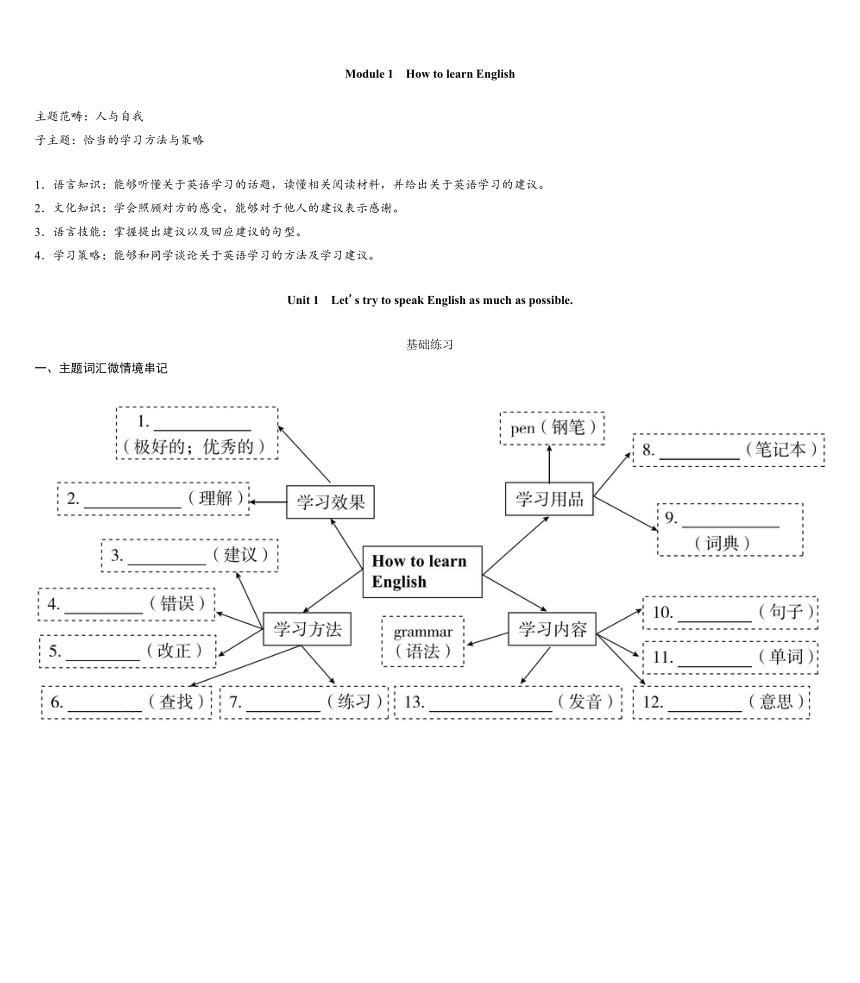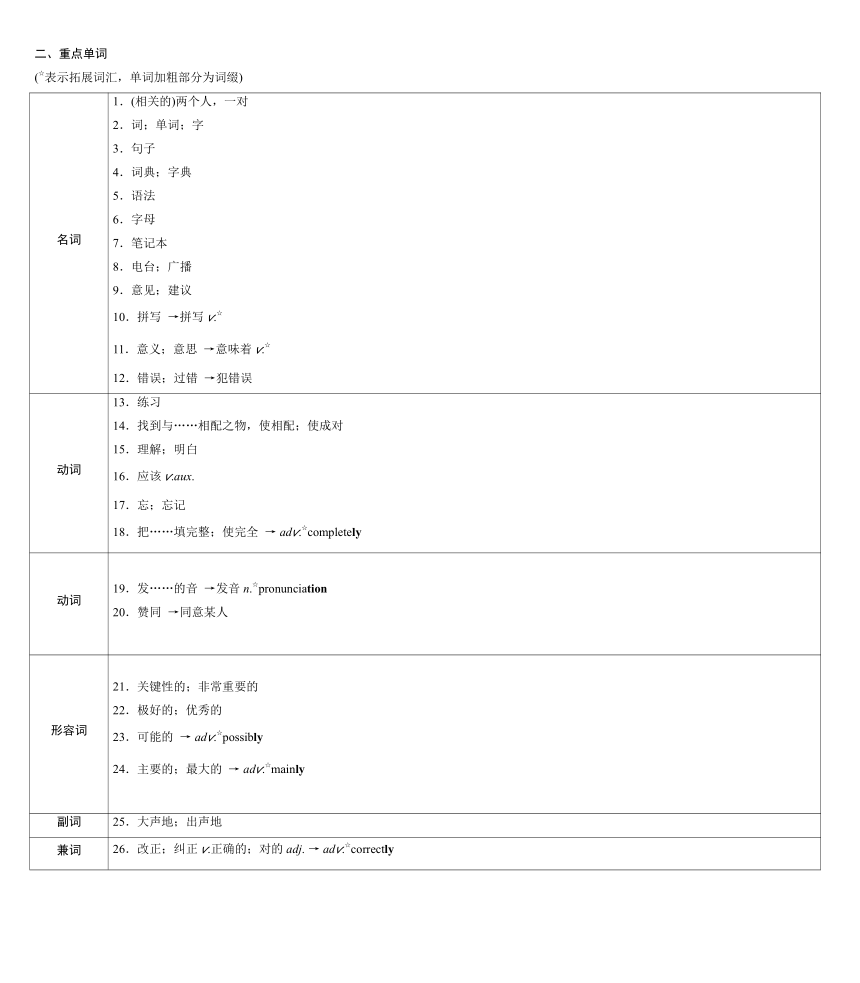Module 1 How to learn English Unit 1 导学案 2024-2025学年外研版英语八年级上册(无答案)
文档属性
| 名称 | Module 1 How to learn English Unit 1 导学案 2024-2025学年外研版英语八年级上册(无答案) |

|
|
| 格式 | docx | ||
| 文件大小 | 171.1KB | ||
| 资源类型 | 教案 | ||
| 版本资源 | 外研版 | ||
| 科目 | 英语 | ||
| 更新时间 | 2024-09-30 00:00:00 | ||
图片预览



文档简介
Module 1 How to learn English
主题范畴:人与自我
子主题:恰当的学习方法与策略
1.语言知识:能够听懂关于英语学习的话题,读懂相关阅读材料,并给出关于英语学习的建议。
2.文化知识:学会照顾对方的感受,能够对于他人的建议表示感谢。
3.语言技能:掌握提出建议以及回应建议的句型。
4.学习策略:能够和同学谈论关于英语学习的方法及学习建议。
Unit 1 Let's try to speak English as much as possible.
基础练习
一、主题词汇微情境串记
二、重点单词
(☆表示拓展词汇,单词加粗部分为词缀)
名词 1.(相关的)两个人,一对 2.词;单词;字 3.句子 4.词典;字典 5.语法 6.字母 7.笔记本 8.电台;广播 9.意见;建议 10.拼写 →拼写v.☆ 11.意义;意思 →意味着v.☆ 12.错误;过错 →犯错误
动词 13.练习 14.找到与……相配之物,使相配;使成对 15.理解;明白 16.应该v.aux. 17.忘;忘记 18.把……填完整;使完全 → adv.☆completely
动词 19.发……的音 →发音n.☆pronunciation 20.赞同 →同意某人
形容词 21.关键性的;非常重要的 22.极好的;优秀的 23.可能的 → adv.☆possibly 24.主要的;最大的 → adv.☆mainly
副词 25.大声地;出声地
兼词 26.改正;纠正v.正确的;对的adj. → adv.☆correctly
三、重点短语
1.尽力做某事
2.尽可能多地
3.查;查找
4.欢迎回来
5.谈论
6.在课堂上
7.为什么不……呢?
8.写下;记下
9.在……旁边
10.做某事是个好主意
11.做某事怎么样?
12.对某人有好处
13.一样
14.给某人写信
四、重点句型
1.Let's speak English .
让我们尽可能多说英语吧。
2.And write down the correct answers next to the mistakes.
而且不要忘记把正确答案写在所犯错误的旁边。
3. to spell and pronounce new words aloud every day.
每天大声拼读新单词是个好主意。
?课堂练习
1.Who has some advice?
探究 Do you have any suggestions
辨析
前前前
advice
前前前
不可数名词:
a piece of advice
一条建议
后后后
suggestion
前前前
可数名词:
a suggestion
一条建议
后后后
基础练 ( )(2023贵港期末)—I can't learn maths well. What should I do
—Why not talk to your teacher He may give you some good ______.
A.news B.information C.advice
迁移练 多么好的一条建议啊!
What it is!
2.And don't forget to write down the correct answers next to the mistakes. (P2)
探究 I forget turning off the lights.
forget
前前前
forget to do sth.
忘记去做某事(没做)
forget doing sth.
忘记做过某事(做了)
后后后
remember
前前前
remember to do sth.
记得去做某事(没做)
remember doing sth.
记得做过某事(做了)
后后后
基础练 ( )Don't forget ______ off the lights before you leave the classroom.
A.turn B.to turn C.turning
迁移练 记得按时把你的书归还图书馆。
your books to the library on time.
3.Yes, that 's good for our pronunciation too. (P2)
探究
辨
析
前前前
be good for 有利于,有益于
be good at 擅长……
be bad for 对……有害/不利
be poor at 不擅长……
后后后
基础练 ( )—Mr Li, why do we always listen to the radio before class
—Listening to the radio ______ our listening.
A.are good for B.is bad for C.is good for
迁移练 ( )Daming ______ playing basketball.
A.is good at B.is bad for C.is good with
4.I agree with you. (P2)
探究
agree
前前前
释义 v.同意
短语
前前前
agree with sb. 同意某人
agree on sth. 同意某事
后后后
基础练 ( )—I think drinking milk every morning is good for our health.
—Yes. I agree ______ you.
A.to B.on C.with
强化练习
一、单项选择
( )1.(2023防城港期末)—I cannot get the right ______ of the English word.
—You should listen to the tape and then read after it.
A.meaning B.grammar C.pronunciation
( )2.—Amy,I'm not good at playing basketball. What should I do
—Why ______ join a basketball club to practise ______ basketball
A.don't; playing B.don't; to play C.not; playing
( )3.—I am going to Australia tomorrow.
—The radio says it is snowy in Australia. Don't forget ______ your warm clothes.
A.take B.to take C.taking
二、完成句子
1.我们有时都会犯错误。
We all sometimes.
2.你还要讲些什么吗?
are you going to talk about
三、完形填空(核心素养:语言能力)
How can you think in English I think the best 1 is to practise as what a football player does every day. During the practice, the football player will pass(传递) the ball to his teammates over and over 2 . So he won't have to think about passing the ball in the game. He will just do 3 . You can train(训练) yourself to think 4 English in this way. First, think of the words that you 5 every day, like “book” or “shoe” or “tree”. For example, 6 you see a “book”, you should think of it in English instead of in your mother language.
Second, after you have learned to think of several words in English, you can start 7 in sentences. Listening and repeating(重复)is a very 8 way to learn a language. Listen first and don't care too much about whether you understand what you're hearing. Try to repeat what you 9 . The more you listen, the more you learn. After you get to a higher 10 , you can begin to have conversations(对话)with yourself in English. This will make you think in English.
( )1.A.way B.day C.game
( )2.A.then B.again C.more
( )3.A.himself B.them C.it
( )4.A.by B.with C.in
( )5.A.get B.use C.learn
( )6.A.when B.because C.so
( )7.A.reading B.thinking C.writing
( )8.A.easy B.hard C.helpful
( )9.A.hear B.say C.see
( )10.A.top B.level C.place
主题范畴:人与自我
子主题:恰当的学习方法与策略
1.语言知识:能够听懂关于英语学习的话题,读懂相关阅读材料,并给出关于英语学习的建议。
2.文化知识:学会照顾对方的感受,能够对于他人的建议表示感谢。
3.语言技能:掌握提出建议以及回应建议的句型。
4.学习策略:能够和同学谈论关于英语学习的方法及学习建议。
Unit 1 Let's try to speak English as much as possible.
基础练习
一、主题词汇微情境串记
二、重点单词
(☆表示拓展词汇,单词加粗部分为词缀)
名词 1.(相关的)两个人,一对 2.词;单词;字 3.句子 4.词典;字典 5.语法 6.字母 7.笔记本 8.电台;广播 9.意见;建议 10.拼写 →拼写v.☆ 11.意义;意思 →意味着v.☆ 12.错误;过错 →犯错误
动词 13.练习 14.找到与……相配之物,使相配;使成对 15.理解;明白 16.应该v.aux. 17.忘;忘记 18.把……填完整;使完全 → adv.☆completely
动词 19.发……的音 →发音n.☆pronunciation 20.赞同 →同意某人
形容词 21.关键性的;非常重要的 22.极好的;优秀的 23.可能的 → adv.☆possibly 24.主要的;最大的 → adv.☆mainly
副词 25.大声地;出声地
兼词 26.改正;纠正v.正确的;对的adj. → adv.☆correctly
三、重点短语
1.尽力做某事
2.尽可能多地
3.查;查找
4.欢迎回来
5.谈论
6.在课堂上
7.为什么不……呢?
8.写下;记下
9.在……旁边
10.做某事是个好主意
11.做某事怎么样?
12.对某人有好处
13.一样
14.给某人写信
四、重点句型
1.Let's speak English .
让我们尽可能多说英语吧。
2.And write down the correct answers next to the mistakes.
而且不要忘记把正确答案写在所犯错误的旁边。
3. to spell and pronounce new words aloud every day.
每天大声拼读新单词是个好主意。
?课堂练习
1.Who has some advice?
探究 Do you have any suggestions
辨析
前前前
advice
前前前
不可数名词:
a piece of advice
一条建议
后后后
suggestion
前前前
可数名词:
a suggestion
一条建议
后后后
基础练 ( )(2023贵港期末)—I can't learn maths well. What should I do
—Why not talk to your teacher He may give you some good ______.
A.news B.information C.advice
迁移练 多么好的一条建议啊!
What it is!
2.And don't forget to write down the correct answers next to the mistakes. (P2)
探究 I forget turning off the lights.
forget
前前前
forget to do sth.
忘记去做某事(没做)
forget doing sth.
忘记做过某事(做了)
后后后
remember
前前前
remember to do sth.
记得去做某事(没做)
remember doing sth.
记得做过某事(做了)
后后后
基础练 ( )Don't forget ______ off the lights before you leave the classroom.
A.turn B.to turn C.turning
迁移练 记得按时把你的书归还图书馆。
your books to the library on time.
3.Yes, that 's good for our pronunciation too. (P2)
探究
辨
析
前前前
be good for 有利于,有益于
be good at 擅长……
be bad for 对……有害/不利
be poor at 不擅长……
后后后
基础练 ( )—Mr Li, why do we always listen to the radio before class
—Listening to the radio ______ our listening.
A.are good for B.is bad for C.is good for
迁移练 ( )Daming ______ playing basketball.
A.is good at B.is bad for C.is good with
4.I agree with you. (P2)
探究
agree
前前前
释义 v.同意
短语
前前前
agree with sb. 同意某人
agree on sth. 同意某事
后后后
基础练 ( )—I think drinking milk every morning is good for our health.
—Yes. I agree ______ you.
A.to B.on C.with
强化练习
一、单项选择
( )1.(2023防城港期末)—I cannot get the right ______ of the English word.
—You should listen to the tape and then read after it.
A.meaning B.grammar C.pronunciation
( )2.—Amy,I'm not good at playing basketball. What should I do
—Why ______ join a basketball club to practise ______ basketball
A.don't; playing B.don't; to play C.not; playing
( )3.—I am going to Australia tomorrow.
—The radio says it is snowy in Australia. Don't forget ______ your warm clothes.
A.take B.to take C.taking
二、完成句子
1.我们有时都会犯错误。
We all sometimes.
2.你还要讲些什么吗?
are you going to talk about
三、完形填空(核心素养:语言能力)
How can you think in English I think the best 1 is to practise as what a football player does every day. During the practice, the football player will pass(传递) the ball to his teammates over and over 2 . So he won't have to think about passing the ball in the game. He will just do 3 . You can train(训练) yourself to think 4 English in this way. First, think of the words that you 5 every day, like “book” or “shoe” or “tree”. For example, 6 you see a “book”, you should think of it in English instead of in your mother language.
Second, after you have learned to think of several words in English, you can start 7 in sentences. Listening and repeating(重复)is a very 8 way to learn a language. Listen first and don't care too much about whether you understand what you're hearing. Try to repeat what you 9 . The more you listen, the more you learn. After you get to a higher 10 , you can begin to have conversations(对话)with yourself in English. This will make you think in English.
( )1.A.way B.day C.game
( )2.A.then B.again C.more
( )3.A.himself B.them C.it
( )4.A.by B.with C.in
( )5.A.get B.use C.learn
( )6.A.when B.because C.so
( )7.A.reading B.thinking C.writing
( )8.A.easy B.hard C.helpful
( )9.A.hear B.say C.see
( )10.A.top B.level C.place
同课章节目录
- Module 1 How to learn English
- Unit 1 Let's try to speak English as much as possi
- Unit 2 You should smile at her.
- Unit 3 Language in use .
- Module 2 My home town and my country
- Unit 1 It's taller than many other buildings.
- Unit 2 Cambridge is a beautiful city in the east o
- Unit 3 Language in use .
- Module 3 Sports.
- Unit 1 Nothing is more exciting than playing tenni
- Unit 2 This year we training more carefully.
- Unit 3 Language in use .
- Module 4 Planes, ships and trains .
- Unit 1 He lives the farthest from school.
- Unit 2 What is the best way to travel.
- Unit 3 Language in use .
- Module 5 Lao She Teahouse.
- Unit 1 I wanted to see the Beijing Opera.
- Unit 2 It descibes the changes in Chinese society.
- Unit 3 Language in use .
- Module 6 Animals in danger.
- Unit 1 It allows people to get closer to them .
- Unit 2 The WWF is working hard to save them all.
- Unit 3 Language in use .
- Revision module A
- Module 7 A famous story
- Unit 1 Alice was sitting with her sister by the ri
- Unit 2 She was thinking about her cat.
- Unit 3 Language in use .
- Module 8 Accidents
- Unit 1 While the car were changing to red, a car s
- Unit 2 I was trying to pick it up when it bite me
- Unit 3 Language in use .
- Module 9 Population
- Unit 1 The population of China is about 1.37 billi
- Unit 2 Arnwick was a city with 200,000 people.
- Unit 3 Language in use .
- Module 10 The weathe
- Unit 1 It might snow.
- Unit 2 The weather is fine all year round.
- Unit 3 Language in use .
- Module 11 Way of life
- Unit 1 In China ,we open a gift later.
- Unit 2 In England, you usually drink tea with milk
- Unit 3 Language in use .
- Module 12 Help
- Unit 1 What should we do before help arrives?
- Unit 2 Stay away from windows and heavy furniture.
- Unit 3 Language in use .
- Revision module B
